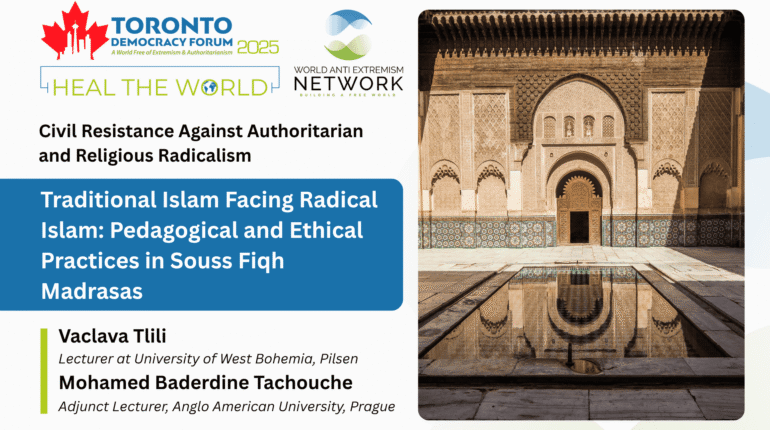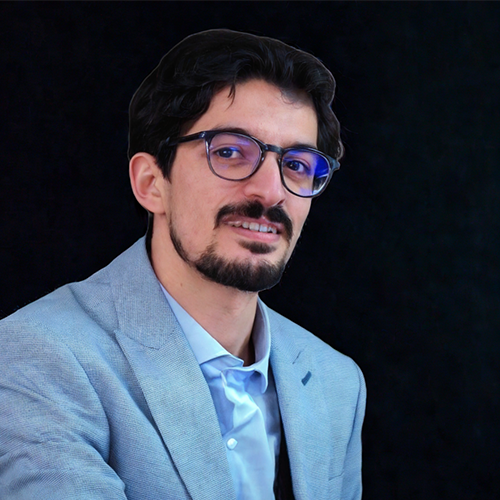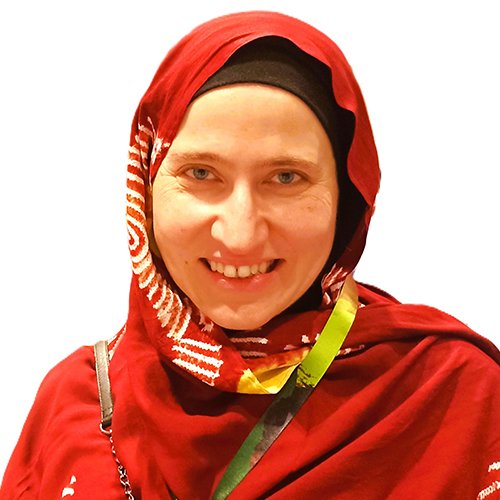
In parts of North Africa, traditional madrasas continue to play a quiet yet transformative role in resisting extremist ideologies. Rooted in community life, these institutions preserve an Islamic heritage built on pluralism, intellectual diversity, and open interpretation. Co-authored by Mohamed Baderdine Tachouche and Vaclava Tlili, this paper explores how madrasas in South Algeria and South Morocco act as everyday agents of civic resistance against radical movements. The paper also highlights how this subtle, nonviolent form of resistance reinforces social stability and protects cultural diversity, and offers valuable insights into how grassroots religious education can quietly shape stronger, more resilient societies.
In short, the excerpt provides perspectives that remain deeply relevant to today’s debates on countering radicalization.
About the authors

Mohamed Badredine Tachouche (Badr) is an adjunct lecturer at Anglo-American University in Prague, where he teaches Europe and Islam: An Interdisciplinary Approach and Composition 101. He is also a postdoctoral researcher at the Department of Middle Eastern and African Studies, University of West Bohemia, and a research fellow with the Islam and Liberty Network in Malaysia. Badr holds a Baccalaureate in Literature and Foreign Languages, a B.A., and an M.A. in the Foundations of Islamic Jurisprudence, and a Ph.D. in Humanities with a specialization in History and Heritage: Islamic Studies from the University of Sidi Mohamed Ben Abdellah, Morocco (2021). His traditional Islamic education includes years of study at madrasahs in Algeria and Morocco, most notably at the historic Al-Qarawiyyin University in Fez. He further expanded his learning through academic visits to institutions in Turkey, Mauritania, and Tunisia, and he holds several Ijāzāt (teaching licenses with authenticated chains of transmission) in core Islamic texts. Badr has published with the University of Oslo, contributed to a range of Arabic media platforms, and reviewed scholarly work for both the Abu Dhabi Forum for Peace and the University of West Bohemia. He has also written and produced television programs and web documentaries. His research interests include Islamic legal theory and Malikism, the history of al-Andalus, pedagogy in Islamic educational settings, and the musicology of al-Andalus. Bridging scholarship and art, he has shared his work through academic publications as well as performances for both scholarly and artistic audiences.

Václava Tlili is a lecturer at the University of West Bohemia in Pilsen, teaching at the Department of Middle Eastern and African Studies, drawing on her academic formation in Ethnology (Ph.D.) as well as traditional training at al-Azhar University in Cairo and al-Zaytuna in Tunis. She specializes in the anthropology of religion and Islamic studies, focusing on lived Islamic traditions, ritual practice, and the social transmission of religious knowledge. Her work combines ethnographic research with historical and textual inquiry. Her research includes studies such as Forms of the Oral and Written Fixation of the Qurʾān Text: An Overview of Islamic and Western Perspectives, The Influence of the Environment on al-Layth bin Saʿd’s School of Islamic Law, Conversion to Islam and the Formation of Identity among Czech Muslim Women, and Uṣūl al-Qirāʾāt: A Brief Overview of the Science of Qurʾān Recitations and Its Formation from the Position of Traditional Qirāʾāt Literature. She is also co-author of the monograph Demography of the Middle East and North Africa and has translated seminal Arabic texts into Czech, including the Constitution of Medina and Umar’s Covenant. Her current research focuses on the anthropology of death and funerary practices in Islam, the resilience of traditional educational institutions (al-madāris al-ʿatīqa) in southern Morocco, and local theologies of sainthood (walāya) connected to pilgrimage sites in North Africa.

